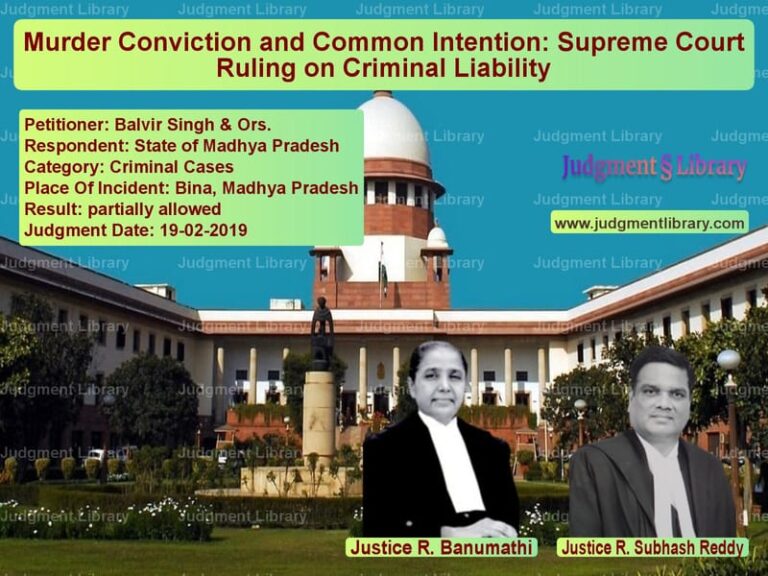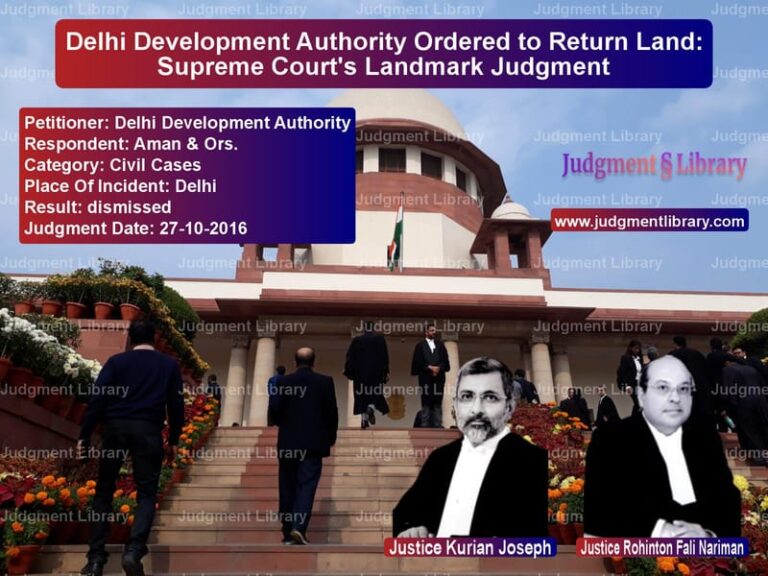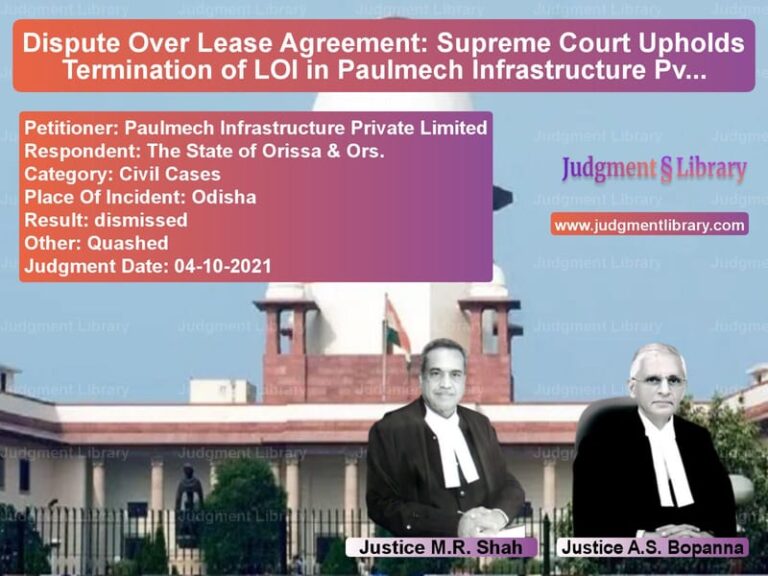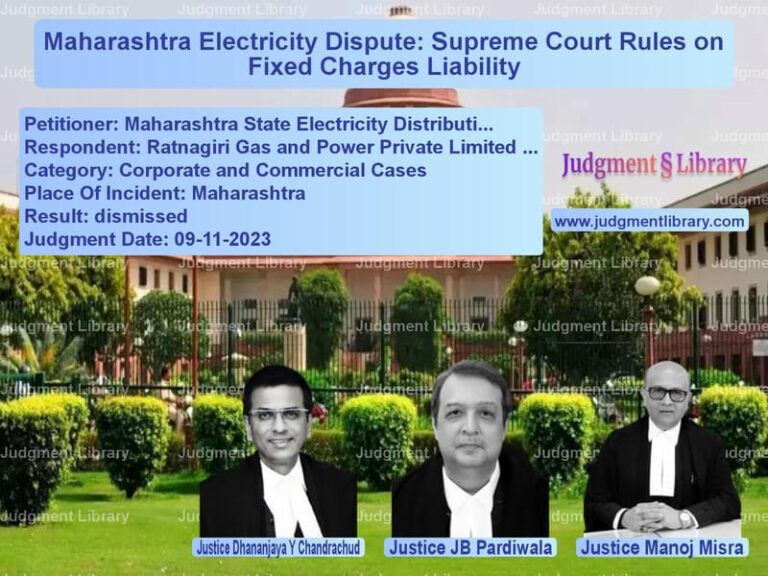Supreme Court Clarifies Limitation Period for Challenging Arbitral Awards – Key Ruling
In a significant judgment delivered on April 3, 2025, the Supreme Court of India dismissed an appeal filed by M/S R.K. Transport Company against M/S Bharat Aluminum Company Ltd. (BALCO), upholding the Chhattisgarh High Court’s decision that an application to set aside an arbitral award was filed within the limitation period. The case, M/S R.K. Transport Company vs. M/S Bharat Aluminum Company Ltd. (BALCO), revolved around the interpretation of the limitation period under Section 34 of the Arbitration and Conciliation Act, 1996 (ACA) and the applicability of the Limitation Act, 1963. The Supreme Court’s ruling provides clarity on the calculation of the limitation period and the exclusion of the day of receipt of the arbitral award.
Background of the Case
The dispute arose from a contract dated April 1, 2002, between the parties for bauxite mining and delivery. Following disagreements over payments, the matter was referred to arbitration, resulting in an arbitral award of Rs. 51,33,40,100 in favor of the appellant (R.K. Transport Company) on April 9, 2022. The respondent (BALCO) received the signed copy of the award on the same day. On July 11, 2022, the respondent filed an application under Section 34 of the ACA to set aside the award, along with a request for a stay of the award’s execution. The Trial Court initially held that the application was filed within the limitation period, as the 3-month period expired on July 9, 2022, a court holiday (second Saturday), and the application was filed on the next working day. The appellant challenged this order, leading to a series of appeals culminating in the Supreme Court’s decision.
Key Issues Before the Supreme Court
- Whether the 3-month limitation period under Section 34(3) of the ACA should be calculated by excluding the day of receipt of the arbitral award, as per Section 12(1) of the Limitation Act, 1963?
- Whether Section 4 of the Limitation Act applies to extend the limitation period if the last day falls on a court holiday?
- Whether the respondent’s Section 34 application was filed within the limitation period?
Appellant’s Arguments
Senior Counsel Mr. Mukul Rohatgi, representing the appellant, made the following submissions:
“The limitation period must be calculated from the date on which the award was received by the respondent, i.e., 09.04.2022, and therefore, the 3-month limitation period expired on 08.07.2022. The Limitation Act, including Section 12, does not apply to proceedings under Section 34 of the ACA. Since the court was working on the date on which limitation expired, Section 4 of the Limitation Act will not apply to hold the application filed on 11.07.2022 as being within the limitation period. There was a 3-day delay in filing the Section 34 application, but the respondent did not file an application for condonation that showed sufficient cause to condone the delay.”
Mr. Rohatgi also argued that the respondent should be required to deposit 100% of the arbitral sum, as the High Court had not provided any reasons for restricting the deposit to 50%.
Respondent’s Arguments
Senior Counsel Mr. Ranjit Kumar, representing the respondent, countered the appellant’s submissions as follows:
“Section 12 of the Limitation Act and the judgment in State of Himachal Pradesh v. Himachal Techno Engineers (2010) 12 SCC 210) mandate that the date on which the arbitral award was received, i.e., 09.04.2022, must be excluded while calculating the limitation period. Hence, the 3-month period commencing on 10.04.2022 expired on 09.07.2022, which was a court holiday. Therefore, Section 4 of the Limitation Act is attracted, and the application was filed in time on the next working day, i.e., 11.07.2022.”
Mr. Kumar also pointed out that the appellant had initially sought a deposit of only 60% of the arbitral sum in its writ petition and, therefore, could not demand a 100% deposit at this stage.
Supreme Court’s Analysis and Decision
The Supreme Court, comprising Justices Pamidighantam Sri Narasimha and Prashant Kumar Mishra, analyzed the statutory provisions and precedents to arrive at its decision. The Court’s key findings are summarized below:
Applicability of Section 12(1) of the Limitation Act
The Court reaffirmed the applicability of Section 12(1) of the Limitation Act to proceedings under Section 34 of the ACA. The Court cited its earlier decisions in Himachal Techno Engineers and State of West Bengal v. Rajpath Contractors and Engineers Ltd. (2024) 7 SCC 257) to hold that the day on which the arbitral award is received must be excluded while calculating the limitation period.
“Section 12 of the Limitation Act, 1963 provides for exclusion of time in legal proceedings. Sub-section (1) thereof provides that in computing the period of limitation for any application, the day from which such period is to be reckoned, shall be excluded. The applicability of Section 12 of the Limitation Act, 1963 to petitions under Section 34 of the Act is not excluded by the provisions of the Act.”
Calculation of Limitation Period
The Court clarified that the 3-month limitation period under Section 34(3) of the ACA is to be calculated as calendar months, not 90 days. Since the respondent received the award on April 9, 2022, this date was excluded, and the limitation period commenced on April 10, 2022. The 3-month period, therefore, expired on July 9, 2022, which was a court holiday (second Saturday).
Applicability of Section 4 of the Limitation Act
The Court held that Section 4 of the Limitation Act applies to proceedings under Section 34 of the ACA. Since the limitation period expired on a court holiday, the respondent was entitled to file the application on the next working day, i.e., July 11, 2022. The Court reiterated its earlier ruling in My Preferred Transformation & Hospitality Pvt. Ltd. v. Faridabad Implements Pvt. Ltd. (2025 INSC 56) to affirm this position.
“Summarising the Current Position of Law: From the reasoning and decisions in the above cases, the following conclusions evidently follow: First, Section 4 of the Limitation Act applies to Section 34(3) of the ACA. Second, Section 4 of the Limitation Act benefits a party only when the ‘prescribed period’, i.e. the 3-month limitation period under Section 34(3) expires on a court holiday. In such a situation, the application under Section 34 will be considered as having been filed within the limitation period if it is filed on the next working day of the court.”
Deposit of Arbitral Sum
The Court declined to interfere with the High Court’s direction to stay the execution of the award and require a 50% deposit, noting that the appellant had already withdrawn the deposited amount and the matter was interim in nature.
Conclusion
The Supreme Court’s judgment in M/S R.K. Transport Company vs. M/S Bharat Aluminum Company Ltd. (BALCO) provides much-needed clarity on the calculation of the limitation period for challenging arbitral awards under Section 34 of the ACA. The Court’s ruling reaffirms the applicability of Sections 12(1) and 4 of the Limitation Act to arbitration proceedings, ensuring that parties are not unfairly prejudiced by court holidays. By dismissing the appeal, the Supreme Court upheld the respondent’s right to challenge the arbitral award within the statutory timeframe, reinforcing the principles of fairness and access to justice in arbitration disputes.
Petitioner Name: M/S R.K. Transport Company.Respondent Name: M/S Bharat Aluminum Company Ltd. (BALCO).Judgment By: Justice Pamidighantam Sri Narasimha, Justice Prashant Kumar Mishra.Place Of Incident: Chhattisgarh.Judgment Date: 03-04-2025.
Don’t miss out on the full details! Download the complete judgment in PDF format below and gain valuable insights instantly!
Download Judgment: ms-r.k.-transport-c-vs-ms-bharat-aluminum-supreme-court-of-india-judgment-dated-03-04-2025.pdf
Directly Download Judgment: Directly download this Judgment
See all petitions in Arbitration Awards
See all petitions in Commercial Arbitration
See all petitions in Enforcement of Awards
See all petitions in Dispute Resolution Mechanisms
See all petitions in Judgment by P.S. Narasimha
See all petitions in Judgment by Prashant Kumar Mishra
See all petitions in dismissed
See all petitions in supreme court of India judgments April 2025
See all petitions in 2025 judgments
See all posts in Arbitration and Alternate Dispute Resolution Category
See all allowed petitions in Arbitration and Alternate Dispute Resolution Category
See all Dismissed petitions in Arbitration and Alternate Dispute Resolution Category
See all partially allowed petitions in Arbitration and Alternate Dispute Resolution Category







